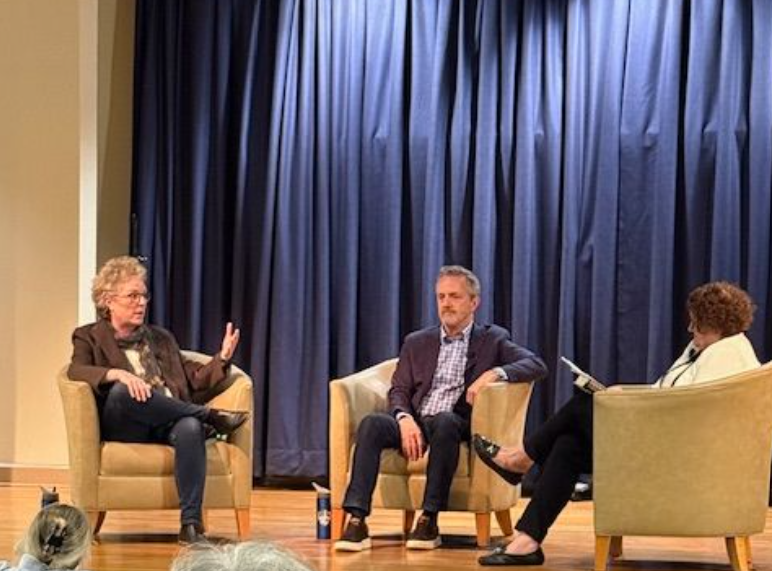NYT Writers Discuss Research On Trump's Business Career
NYT Writers Discuss Research On Trump's Business Career
Reporters Russ Buettner and Susanne Craig discuss their journey investigating the personal finances of the 45th and 47th president.
(The Panelists: Susanne Craig (left), Russ Buettner (center) and Dr. Alecia Swasy (right).| SOURCE: Author)
Donald Trump’s “father set him up in business, bankrolled his earliest projects, co-signed on his loans, [and] gave him more money when the project started losing money,” remarked Russ Buettner in Washington and Lee University’s Stackhouse Theater on March 25, 2025.
New York Times and Pulitzer Prize-winning investigative reporters Russ Buettner and Susanne Craig have focused on President Donald Trump’s personal finances and business career since 2016. They co-authored the 2024 book Lucky Loser: How Donald Trump Squandered His Father's Fortune and Created the Illusion of Success, which was the focus of their talk. Professor Alecia Swasy, the Donald W. Reynolds Professor of Business Journalism at W&L, moderated the panel.
Swasy began by questioning the actual reality of Trump’s businesses, mentioning Trump’s claim to be a “self-made billionaire” who “started with a small loan from his father.” Buettner stated that Trump’s assertion is false based on financial records, which reveal that Trump’s father, Fred Trump, supported most of his business endeavors. Buettner stated that the funding amounts to roughly “half a billion dollars” when adjusted for inflation.
Regarding how she began researching Trump’s finances, Craig shared that she initially received “three pages of his [Trump’s] 1995 tax return” for a story after he declared candidacy for the 2016 presidential election.
Expanding on Trump’s tax returns, Craig revealed that they initially showed “massive losses,” but then somehow showed “he had turned a profit.” This irregularity led them to investigate “how he went from that billion-dollar loss” to “how he got into a profit position.” As Buettner and Craig continued their research, they found that Trump’s “businesses, for the most part, don't make money.”
Dr. Swasy specifically directed the panelists to address an instance at the military school Trump attended. Craig said that Trump asked his friend at the school, Michael Scadron, to switch jackets with him for the class photo because Michael “happened to have more medals on his jacket.”
Dr. Swasy discussed Trump’s relationship with the media, claiming that “Trump despises the news media” and “calls us the enemy of the American people.” Buettner highlighted how Trump’s past contained the opposite relationship, as Trump was “famous for cultivating relationships with reporters, especially gossip columnists during the 90s.” Buettner added that Trump’s efforts worked out because “he got stories planted all the time, repeating his claims that he was worth a billion dollars independent of his father.”
The panelists mentioned Mark Burnett, producer of Trump’s TV show “The Apprentice.” Craig argued that Burnett was a “sort of the second father figure in a way, financially” for Trump. Buettner added that when the two made the deal to do the show, Trump was “not in a great state of affairs” because his casinos were close to bankruptcy. Craig then pointed out that Burnett now serves as “a special ambassador to England.”
Eventually, the panel discussion shifted to discussing Trump as a politician and his recent interactions with journalists. Buettner stated that Trump’s political ascent was “another lucky stroke in his life,” adding that Trump’s actions and statements were not “scrutinized in the way that political candidacy has historically been scrutinized.”
He referred to the “horrible things [Trump has said] about Mexican people” and Trump’s claim that “John McCain is not a war hero.” Buettner stated that organizations like Fox News “created a sort of excuse machine, another protective bubble for Donald Trump where all of that would be rationalized” and where “the people who support him would be told, you're more patriotic, your view of the world is better, you're superior to the people who are supporting these crazy libs.”
Swasy then asked the panelists to talk about Trump’s failed lawsuit against the New York Times, which resulted in him having to pay the Times’ legal fees. Craig added that the lawsuit was “over the 2018 story where we alleged that he had engaged in tax fraud,” in which Trump claimed that Craig, Buettner and one of their colleagues caused Trump’s niece to break a confidentiality agreement by giving the reporters certain documents.
The panel was then opened up for audience questions. One question asked whether The Atlantic should have published the messages from the recent Trump Administration security leak. Buettner responded that the reporter who got added to the chat “was very careful and very judicious to not release things that could have caused harm.” One day after the event, the Atlantic published all of the messages.
The panelists were then asked if their work had made them feel vulnerable or unsafe. Craig responded that the Times has prepared them for potential dangers through things like “active shooter training.” She added that because she is “a contributor at MSNBC,” “people recognize me on the street, and you don't know when somebody comes up to you what's gonna happen.” She even stated that she has had her “tires slashed.”
Craig then discussed Trump’s legal efforts against the media, saying, "With Donald Trump, the point is often to litigate to destroy, not to win, and to wear you down.” Buettner elaborated, arguing that America has not “really seen the limits yet of this kind of retribution campaign that Donald Trump is on.”


